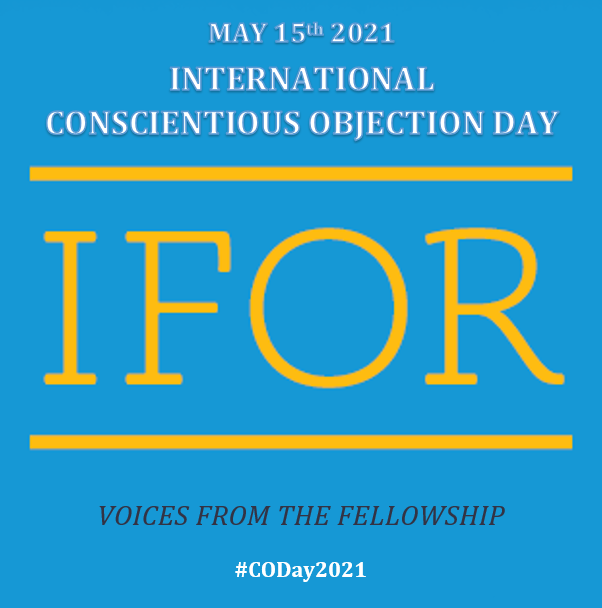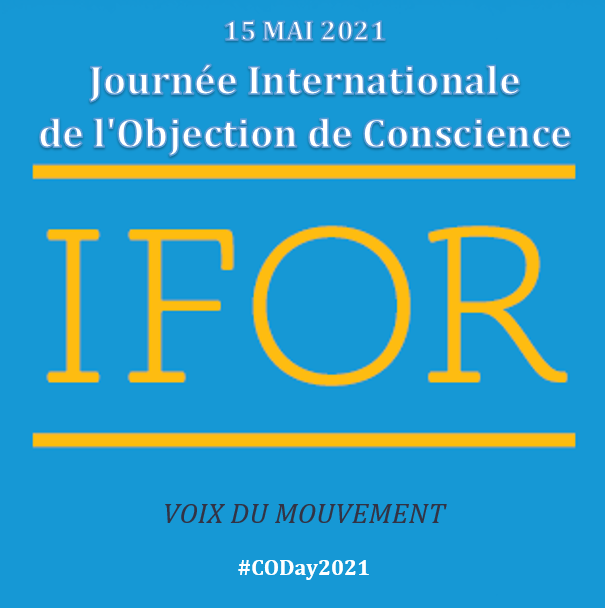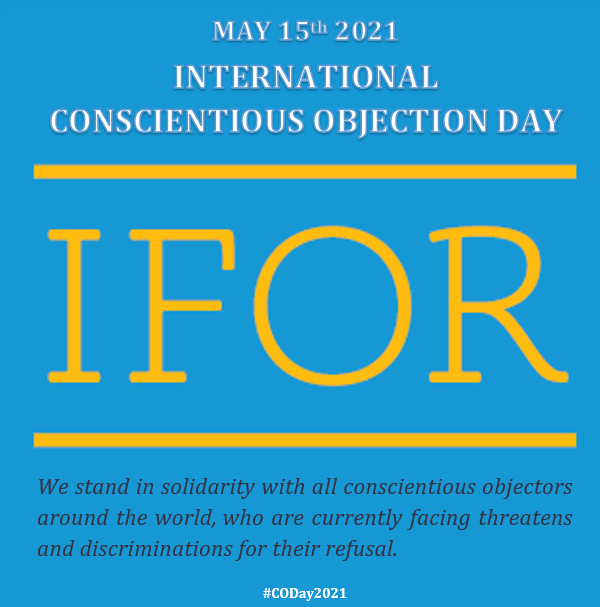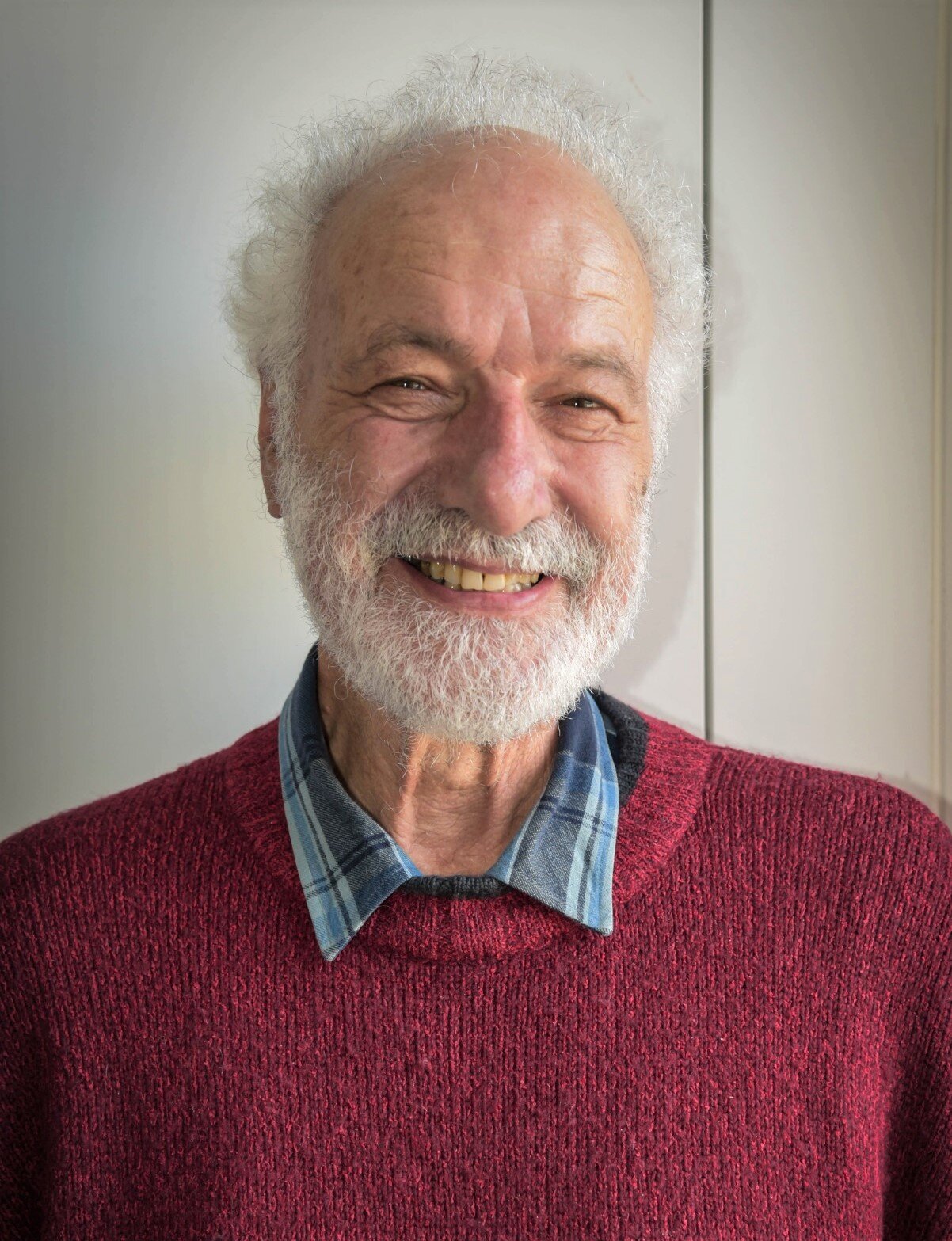#CODay2021
VOICES FROM THE FELLOWSHIP
Conscientious objection to military service is part of IFOR history, and it has been at the core of its original engagement since 1914. It's one of our roots. Many members were and are objectors. Several local efforts contributed to the recognition of the right in many countries. There is still work to do about it and IFOR is fully engaged in this field, and it is also running a thematic project supported by the Joseph Rowntree Charitable Trust.
On the occasion of the
International Conscientious Objection Day - May 15th,
we are sharing the voices of the members of IFOR around the world, on conscientious objection.
It is about a valuable heritage and a particular perspective on the present situation. As we talk about conscientious objection to military service we also refer to initiatives which deal with the refusal to support militarism. Unfortunately, we are currently witnessing an increase in the militarization of society and thus of the Culture of violence. We work for a positive change and the implementation of a Culture of Peace and Nonviolence.
We are pleased to share personal contributions from the fellowship, on conscientious objection!
You will read testimonies about past initiatives, current campaigns, individual struggles, personal understanding, research of nonviolent alternatives, rejection of violence, compassion, faith, political engagement...
We stand in solidarity with all conscientious objectors in the world, who are currently facing threatens and discriminations for their refusal.
We dedicate these testimonies to them and to all those who struggled throughout the past decades.
Last year on CODay2020 we made a dedicated publication which you can find here.
If you would like to learn more about the current work of IFOR on conscientious objection and on the ongoing thematic project funded by JRCT, you are welcome to contact the project Coordinator here: zaira.zafarana@ifor.org
L'OBJECTION DE CONSCIENCE AU SERVICE MILITAIRE
#CODay2021
VOIX DU MOUVEMENT
L'objection de conscience au service militaire fait partie de l'histoire d'IFOR et elle est au cœur de son engagement originel depuis 1914. C'est l'une de nos racines. De nombreux membres ont été et sont des objecteurs. Plusieurs efforts locaux ont contribué à la reconnaissance de ce droit dans de nombreux pays. Il y a encore du travail à faire à ce sujet et l'IFOR est pleinement engagé dans ce domaine et il mène également un projet thématique soutenu par le Joseph Rowntree Charitable Trust.
A l'occasion de la Journée Internationale de l'Objection de Conscience - 15 mai,
nous partageons les voix des membres d'IFOR à travers le monde, sur l'objection de conscience.
Il s'agit d'un héritage précieux et d'une perspective particulière sur la situation actuelle. Lorsque nous parlons d'objection de conscience au service militaire, nous faisons également référence aux initiatives qui traitent du refus de soutenir le militarisme. Malheureusement, nous assistons actuellement à une augmentation de la militarisation de la société et donc de la culture de la violence. Nous travaillons pour un changement positif et la mise en place d'une Culture de la Paix et de la Non-violence.
Nous avons le plaisir de partager des contributions personnelles de la Fellowship, sur l'objection de conscience!
Vous lirez des témoignages sur les initiatives passées, les campagnes actuelles, les luttes individuelles, la compréhension personnelle, la recherche d'alternatives non-violentes, le rejet de la violence, la compassion, la foi, l'engagement politique...
Nous sommes solidaires de tous les objecteurs de conscience dans le monde, qui sont actuellement confrontés à des menaces et des discriminations pour leur refus.
Nous leur dédions ces témoignages et à tous ceux qui ont résisté au cours des dernières décennies.
L'année dernière, à l'occasion du CODay2020, nous avons réalisé une publication dédiée que vous pouvez trouver ici.
Si vous souhaitez en savoir plus sur le travail actuel d'IFOR sur l'objection de conscience et sur le projet en cours financé par le JRCT, vous pouvez contacter le coordinateur du projet ici: zaira.zafarana@ifor.org
OBJECIÓN DE CONCIENCIA AL SERVICIO MILITAR
#CODay2021
VOCES DEL MOVIMIENTO
La objeción de conciencia al servicio militar forma parte de la historia de IFOR y ha estado en el centro de su compromiso original desde 1914. Es una de nuestras raíces. Muchos miembros fueron y son objetores. Varios esfuerzos locales contribuyeron al reconocimiento del derecho en muchos países. Todavía queda trabajo por hacer al respecto y la IFOR está plenamente comprometida en este campo y también está llevando a cabo un proyecto temático apoyado por el Joseph Rowntree Charitable Trust.
Con motivo del Día Internacional de la Objeción de Conciencia - 15 de mayo, compartimos las voces de los miembros de IFOR de todo el mundo, sobre la objeción de conciencia.
Se trata de un valioso patrimonio y de una perspectiva particular sobre la situación actual. Al hablar de la objeción de conciencia al servicio militar nos referimos también a las iniciativas que tratan del rechazo al apoyo al militarismo. De manera lamentable, actualmente asistimos a un aumento de la militarización de la sociedad y, por tanto, de la cultura de la violencia. Trabajamos por un cambio positivo y la implantación de una Cultura de Paz y No-Violencia.
Nos complace compartir ¡Contribuciones personales de la hermandad, sobre la objeción de conciencia!
Leerás testimonios sobre iniciativas pasadas, campañas actuales, luchas individuales, comprensión personal, búsqueda de alternativas no violentas, rechazo a la violencia, compasión, fe, compromiso político...
Nos solidarizamos con todos los objetores de conciencia del mundo que actualmente se enfrentan a amenazas y discriminaciones por su objeción.
A ellos les dedicamos estos testimonios y a todos los que han resistido durante las últimas décadas.
El año pasado, en el Día de la Objeción de Conciencia2020, hicimos una publicación dedicada que puedes encontrar aquí.
Si desea saber más sobre el trabajo actual del IFOR en materia de objeción de conciencia y sobre el proyecto en curso financiado por la JRCT, puede ponerse en contacto con el coordinador del proyecto aquí: zaira.zafarana@ifor.org
J’étais, je suis, et je resterais Objecteur de Conscience !
Pierre Marchand - France
Read the English version here.
Ce jour-là, mon frère - qui était pourtant très « anticatholique » - m’a offert un livre d’un… prêtre : l’Abbé Jean TOULAT, journaliste et écrivain. Le titre était « Les grévistes de la guerre ». Je l’ai lu avec beaucoup d’attention, religieusement. Ce livre était consacré à l’objection de conscience et l’auteur en faisait ouvertement la promotion au nom de l’évangile. Aux trois quarts du livre, ma décision était prise… Cliquez ici pour en lire plus.
My conscientious objection to army service in 1973 in Switzerland
Ueli Wildberger - Switzerland
Born just after WWII in July 1945, the atrocities of the Nazi-Regime in Germany and World War II were still omnipresent in my early years, growing up in a modest family of schoolteacher in a remote village only 10 km from the German border near Schaffhausen!
Since then the horrors of war and holocaust were very vivid in my memory. At the same time I grew up sharing the overwhelming conviction of Swiss people, that our strong militia defense and army had saved our nation from being invaded and destroyed in WWII. So despite my repugnance to take arms and to serve in the army I absolved my recruitment service of 4 months and 5 subsequent yearly repetition courses of 2 weeks due to the strong pressure of my family and friends… Click here to read more.
Conscientious Objection Changed My Life
J. Kenneth Kreider – U.S.A.
Growing up in a Church of the Brethren family, it was natural for me to be in accord with the teachings of the “historic peace churches” (Society of Friends, Mennonites, and Church of the Brethren), regarding participation in military activity. At the age of 18 I followed United States law by registering with Selective Service—as a conscientious objector. Click here to read more.
I still believe in conscientious objection and nonviolent action, heart and soul
Chris Harmer - U.S.A.
My name is Chris. I was born in 1950. I grew up a white, middle-class male in a suburban, traditional family in the upper South of the United States.
I am aware that my life was and remains an easy life of privilege, for which I am incredibly grateful. What was given from the circumstances of my birth is what all people deserve.
My life’s direction was forever changed in the 1960s by the intersection of the Christian ecumenical movement in the US and by our country’s deepening involvement in the Vietnam War… Click here to read more.
J'ai refusé
Michel Monod – Suisse
J'ai accompli le service d'instruction militaire de 4 mois en 1960 puis j'ai refusé les ordres de marche suivants. Cela m'a valu un procès au tribunal militaire et une condamnation de 4 mois de prison à Saint Antoine à Genève. Puis j'ai refusé à nouveau 2 fois les ordres de marche et j'ai été condamné à 2 mois puis un mois et enfin exclu de l'armée… Cliquez ici pour en lire plus.
MY SMALL CONSCIENTIOUS OBJECTION
Piercarlo Racca - Italy
In 1968, when I was 22 years old, I decided to object to military service. I had participated in the Milan-Vicenza anti-militarist march and was convinced of the need to oppose the military institution. It was also the year in which the communist armies of the Warsaw Pact occupied Prague, putting an end to the "socialism with a human face". Click here to read more.
Personal Experience with Conscientious Objection
Pete Hämmerle - Austria
When I decided to object to military service, this was in the context of the Cold War in the late 1970s, in a neutral country (Austria) with mandatory conscription for all young men. Alternative service (Zivildienst) had only become a possibility a few years before (1974), and the image of COs in society in general was that of “cowards”, no “real men”, trying to escape their “duty towards society and the state”… Click here to read more.
From Conscientious Objection to Resistance to Peace: USA to Mozambique and Beyond
Matt Meyer – U.S.A.
Growing up in the 1960’s, with images of the US war in Vietnam and Southeast Asia playing out on the television screen as full color background to my earliest memories, I often note that my parents were “natural born pacifists.” Neither of them belonged to any peace groups or attended demonstrations, but the idea that “war was wrong” permeated our household. In 1979, when US President Jimmy Carter suggested bringing back registration for the draft as a show of strength in the face of Soviet incursions to Afghanistan, my own high school senior mentality drove these anti-war instincts into high gear… Click here to read more.
A slice of sky behind bars
Claudio Pozzi - Italy
From April 21st 1972 to September 30th 1972 I was detained in the military prison of Gaeta for refusing to carry out military service as a Catholic. I was released from prison on October 1st and on December 15th it was approved the law which finally recognized the right to object in Italy, as well. I also wrote a book about this titled Uno spicchio di cielo dietro le sbarre, Diario dal carcere di un obiettore di coscienza al servizio militare negli anni ’70… Click here to read more.
Dangerous fools: my story about being a conscientious objector
Larry Coleman - U.S.A.
On a spring day, I sat with my classmates at a table in the training room with the ROTC test on the table in front of me. The instructor for the final test admonished us to do well, so we could enlist as an Army Officer. The pitch to become an officer was made enticing, a slam dunk. The perks were emphasized, but there was little or no mention of the dangers. Certainly, there was no sober, deep thinking about the damage wars perpetrate… Click here to read more.
Do Not Fear, But Trust!
Gyula I. Simonyi - Hungary
We were seven conscientious objectors convicted in court, from the community I established in our city, Székesfehérvár. Click here to read more.
La branche belge de l’IFOR et l’objection de conscience
Sam Biesemans - Belgique
En Belgique, la section belge de l’IFOR qui s’appelle aujourd’hui Agir pour la Paix (dans le passé « MIR-IRG ») a joué un rôle crucial pour influencer le débat politique qui mena à la loi de 1964 portant le statut d’objecteur de conscience au service militaire. Il a fallu 15 ans d’initiatives et de débats parlementaires pour y parvenir. Le sacrifice personnel et l’engagement constant de Jean Van Lierde, qui endura une longue peine de prison et fut ensuite contraint de travailler dans une mine de charbon, ont porté leurs fruits… Cliquez ici pour en lire plus.
Thomas Merton and the Army that Sheds No Blood
Jim Forest – U.S.A.
Here it is a presentation on Thomas Merton, a FOR member and writer whose books were very widely read and who was himself a conscientious objector.
Me too! I left the US Navy as a conscientious objector, after two years in uniform… Click here to read more.
Military conscription also for girls in the Netherlands
Henk Blom - Netherlands
Since 2020, girls are also subject to compulsory military service in the Netherlands. All more than 100,000 girls born in 2003 have received a letter from the Ministry of Defense informing them that they are registered for military service. With a view to equal treatment of men and women, it was believed that women should also be registered for military service. Click here to read more.
We thank all those who contributed!
Nous remercions tous ceux qui ont contribué ! ¡Agradecemos a todos los que contribuyeron!
Page being updated: if you would like to share as well your personal experience on conscientious objection you are welcome to do so, writing to office@ifor.org, or leave a message below here.
Page en cours de mise à jour: si vous souhaitez partager également votre expérience personnelle sur l'objection de conscience, vous pouvez le faire en écrivant à office@ifor.org ou en laissant un message ci-dessous ici.
Página en actualización: si desea compartir también su experiencia personal sobre la objeción de conciencia, puede hacerlo, escribiendo a office@ifor.org, o deje un mensaje a continuación aquí.







